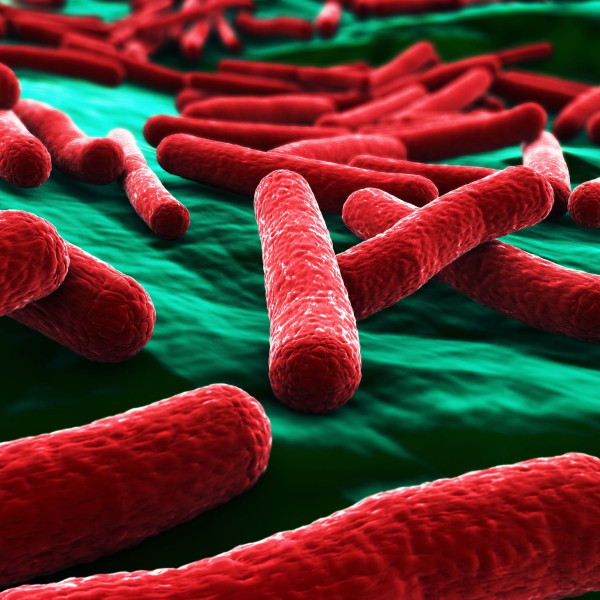
What is the Escherichia coli pathogen?
The Escherichia coli pathogen, also known as the coliform bacterium, is one of the best-known species of bacteria belonging to the Escherichia genus. It is a gram-negative, acid-forming bacterium that is an integral part of the human microbiota and that of other warm-blooded animals. There are different strains of the Escherichia coli pathogen, many of which are harmless. Others, however, can cause intestinal diseases. The pathogen was named after the German paediatrician Theodor Escherich, who first isolated and described the bacterium in 1886.
What are the characteristics of the Escherichia coli pathogen?
The Escherichia coli pathogen is an asporic bacterium that can survive in both an oxygen-rich and an oxygen-poor environment. The pathogen ferments lactose and has protuberances under the microscope that allow it to attach to the wall of the organ it is colonising.
How can you get infected with Escherichia coli?
In most cases, an Escherichia coli infection originates from contaminated water and/or food. Food that is distorted raw, such as fruit and vegetables, is particularly affected. But above all, the consumption of unpasteurised milk or raw meat can be dangerous for small children and elderly people. If an Escherichia coli infection develops from this, a life-threatening form of kidney failure can even develop in this group of people. In this context, doctors speak of the so-called haemolytic-uraemic syndrome. To protect oneself from infection, it is advisable to boil the food beforehand, as Escherichia coli pathogens are sensitive to heat. Infection from person to person is also possible if the infected person has not washed their hands properly.
How can an infection be prevented?
Infection with Escherichia coli pathogens in the intestinal area can be prevented by thorough hand hygiene and regular personal hygiene. An infection with the pathogens in the urinary system, on the other hand, can be prevented by natural substances. These are designed to make it impossible for the pathogen to attach itself to the walls of the urethra or bladder. These natural substances include food supplements based on red fruits, blueberries or grapefruit. Taking these substrates is especially recommended for those who frequently get urinary tract infections caused by Escherichiae coli.
What are the symptoms of Escherichia coli infections?
Intestinal infections caused by Escherichia coli strains can manifest themselves with the following symptoms:
- Fever attacks, which usually occur in the early stages of the disease,
- Abdominal pain,
- Vomiting,
- bloody diarrhoea
In addition, extraintestinal diseases such as a urinary tract infection or peritonitis may occur. In particularly severe cases, blood poisoning, pneumonia and/or meningitis can develop.
What is the course of an Escherichia coli infection?
As a rule, the first symptoms appear about 12 hours to a few days after the infection and last about a week. Very often, infection occurs in developing countries due to the precarious hygienic-sanitary conditions. An Escherichia coli infection does not necessarily have to manifest itself as an intestinal disease. It is often possible for the infection to develop in other organs and cause, for example, a bladder infection, a urinary tract infection or a pneumonia or meningitis. In some cases, it can even lead to blood poisoning.
How is an Escherichia coli infection diagnosed?
If there is a long-lasting, severe diarrhoeal illness, it is useful to do a culture to see if the bacterium is present in the intestine. If an Escherichia coli infection affecting the ureters is suspected, the pathogen can often be diagnosed by performing a urine culture.
In pregnant women, a monthly urine test is required to detect the pathogen. If the pathogen is detected, it is important to start specific antibiotic treatment to completely eliminate the bacterium.
How are Escherichia coli infections treated?
Since Escherichia coli are bacteria, they can be treated well by antibiotics. Carbapenems in particular, a special group of antibiotics, have been shown to be effective.
However, in most cases, antibiotic treatment is not necessary at all. Instead, the infection is treated purely symptomatically. The particular form of treatment depends on the severity of the illness. In most cases, especially with diarrhoeal diseases, the intake of fluids and salt is necessary. This is because the infection causes patients to lose salts (electrolytes) such as sodium and potassium, which are important for an intact heart function or for the nerves and muscles. Drugs to combat diarrhoea are usually not prescribed, as the excretion also flushes the pathogen out of the intestine.
What complications can result from an Escherichia coli infection?
An Escherichia coli infection can lead to bladder infections or an infection of the urethra (urethritis). If the disease is not treated appropriately, the severity of the infection increases. In a few cases, it is even possible for a haemolytic uraemic syndrome (HUS syndrome) to develop. Especially in children, but also in older persons, this can lead to serious impairment. So-called plasmapheresis can be used to treat HUS syndrome. This involves purifying the patient's blood plasma.
In general, older people and children are at the greatest risk of developing complications from an Escherichia coli infection. Above all, a state of dehydration due to severe diarrhoea is risky for these groups of people. It is therefore important that those affected are adequately hydrated and that a paediatrician is consulted early on, especially in the case of young children. Children often develop the condition as they tend to put their hands in their mouths.
